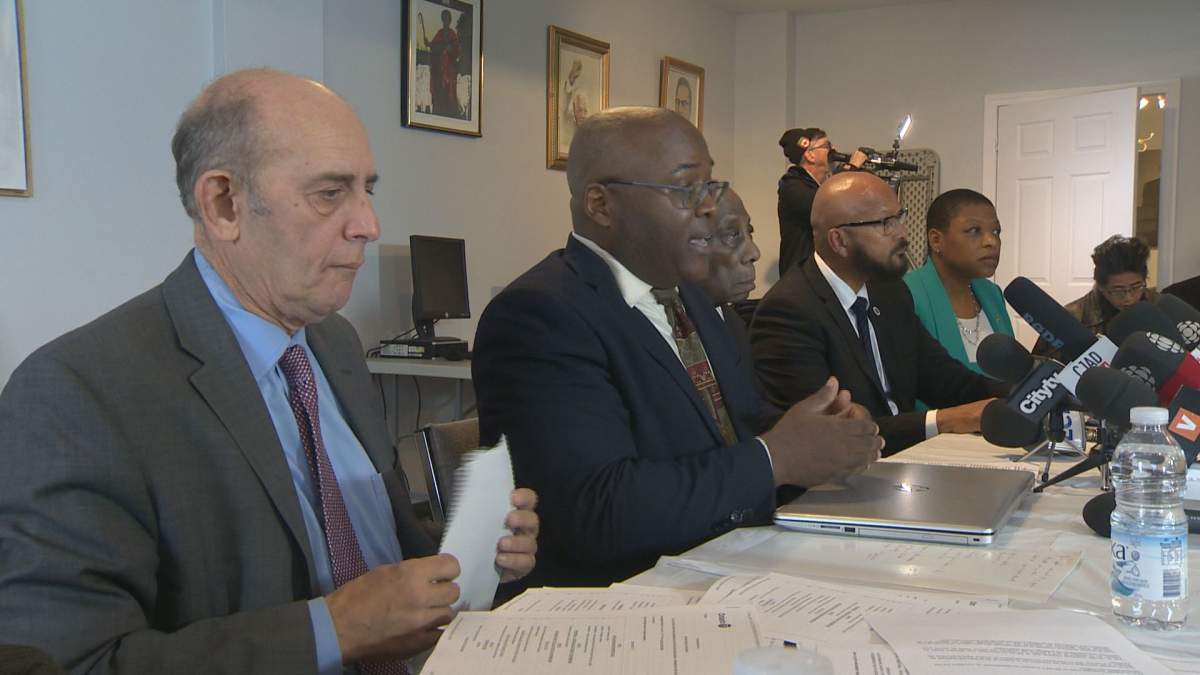The Black Coalition of Quebec and other associations gathered on Friday asking that Montreal Police stop street checks “targeting Black and Cultural communities.”

Côte-des-Neiges–Notre-Dame-de-Grâce City Councillor Marvin Rotrand presented a motion at City Council asking police chief Sylvain Caron to impose an immediate moratorium on the practice of Police street checks. Additionally, Rotrand requested the Ministers of Justice and Public Security of Quebec to propose legislation that would permanently ban police street checks in the province.
“Almost 34 per cent of the population of Montreal is stopped because of their racial and ethnic origin and not because they’ve done anything,” said Rotrand.
Alain Babineau, former police officer and advisor for CRARR said he’s seen the impact and negative effects street checks can have on the black community.
‘A street check typically involves stopping a community member, questioning them, and entering that information into a database,” said Babineau. “Whenever a subject’s information is entered in a database, the person becomes known to the police.”
Babineau notes, streets checks are “a means to gather personal information from citizens who police officers might suspect to be involved in criminal activity.”

Get daily National news
READ MORE: Indigenous, black people more likely to be stopped by Montreal police: report
Members and associations in the Black and Cultural communities are asking for Montreal to follow in Ontario’s footsteps and enact legislation similar to their 58/16 Regulation aimed at regulating street checks.
- High blood pressure drug recalled over low blood pressure pill mix-up
- ‘Doesn’t make sense’: Union files labour complaint over federal 4-day in-office mandate
- Canadian Tire ordered to pay nearly $1.3 million for false advertising
- Ottawa gives Canada Post a $1.01-billion loan amid ongoing financial struggles
This conference comes a few weeks after a report was published by three University professors who found in Montreal, visible minorities are more likely to be stopped than their white counterparts by officers with the city’s police force.
The report conducted by Victor Armony of the Université du Québec à Montréal’s sociology department, Mariam Hassaoui of Université TELUQ and Massimiliano Mulone of the Université de Montréal’s school of criminology unveiled data analyzed from 2014 to 2017.
The findings showed there is “significant, widespread and persistent disproportions” of racialized people who are stopped by police officers. The report also pointed to “the presence of systemic biases” linked to race during police interventions but stops short of concluding it was racial profiling.
The Montreal Police’s chief Sylvian Caron reacted to the report saying he was both concerned and surprised with the findings.
“This report does not report racial profiling at the SPVM,” said Caron. “It does indicate big and concerning disparities.”
READ MORE: Racial profiling class-action lawsuit against Montreal gets green light
Last December, Caron presented city council with the 2018-21 plan to prevent racial profiling — a document that included building stronger ties with communities.
The police department said on Oct. 7, it wants to work with the authors of the study on racial profiling and eliminate problems of discrimination among its ranks. The police plans to implement new measures and follow the five recommendations outlined in the report.
In August, a Quebec Superior Court judge authorized a class-action lawsuit against the City of Montreal on behalf of citizens who allege they were unfairly arrested and racially profiled by the city’s police.
At the press conference on Friday, Babineau quoted Ontario Superior court judge Honourable Michael H. Tulloch.
“Carding is a practice that no longer has its place in modern policing,” said Babineau echoing Tulloch. “What began as a legitimate police practice became one with high potential for abuse. Just because it might be useful for the police to have a certain power, it doesn’t mean that they should have that power.”
— With files from Global News’ Kalina Laframboise








Comments